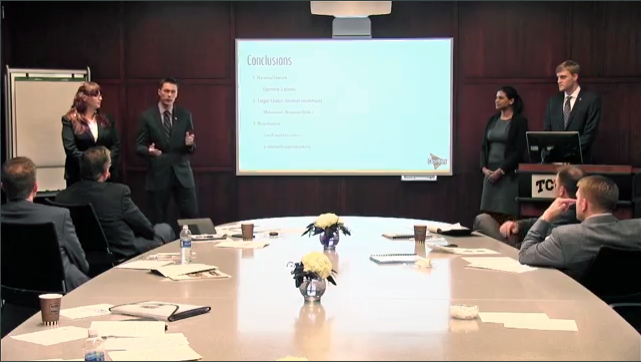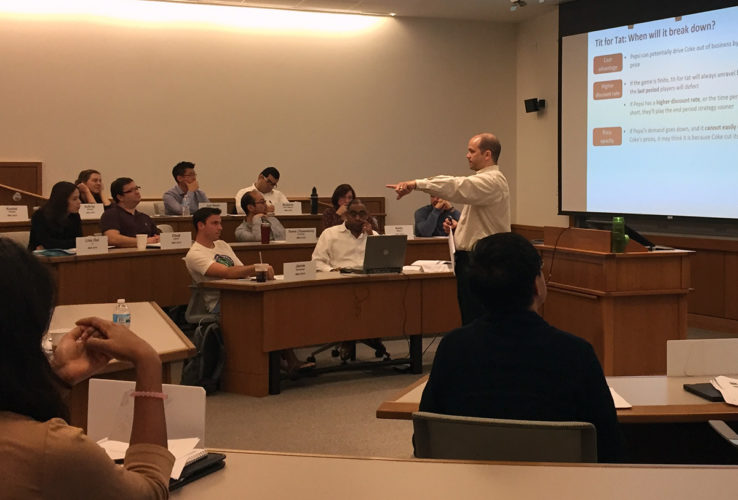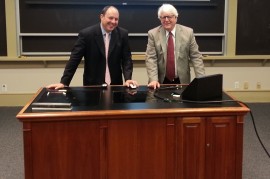One of the most frequent pieces of advice I got while talking with people about pursuing an MBA was “you get the most out of your MBA if you know what you want out of it.” Unfortunately, this is much easier said than done… at least for me. As I have written in my previous two August and September posts about first-year MBA life, much of my Olin experience so far has been exploring a diversity of opportunities inside and outside the classroom and deciding what I want from my MBA. Over the past month and a half, determining my focus for the next few years has been increasingly important. Decisions must be made.
Getting my MBA had been a long-term goal in the back of my mind ever since I left high school. When I finally started my MBA eight years later—after earning dual business and journalism degrees at Mizzou, working three years at Cerner, and traveling for a full year to all the U.S. National Parks—I knew a few things.
I knew I wanted to grow into a business leader. I knew I wanted to learn to question boldly and think strategically. I knew I wanted a high-caliber education and top-notch classmates that challenge and push me. The one thing I didn’t know was maybe the most important: Where in the world do I want to end up?
By the time the MBA program started in August, I had convinced myself I had answered this daunting question: Brand Management. I always enjoyed flexing my creative muscle and communications skills, so pivoting to a career within marketing seemed like a good fit. And concentrating on brand management within Olin’s marketing platform sounded like a great way to also satisfy my interest in a job with variety and responsibility, since I could take ownership of running all aspects of a brand. So brand management was the goal I wrote about in my applications essay and talked up to my family. It felt good to have direction.
As my first semester ramped up, I learned more and more about brand management through discussions with classmates, meetings with career advisors, chatting with recruiters, reading job postings and, most helpfully, that marketing industry speakers series I mentioned in my last post. Everything sounded good. The only problem was that I kept being reminded of the reason I’d originally become interested in business, of the passion I’d had ever since I started my own soccer camp at 12 years-old: entrepreneurship.

This month I participated in my first case competition at TCU in Fort Worth, Texas.
When I left eight years ago for my undergraduate degree, the startup scene in St. Louis was so low key it wasn’t even on my radar. Ever since getting back to the city this August for the program, I’ve been shocked to learn how entrepreneurship in the city is thriving. Apparently, St. Louis is now a burgeoning BioTech and FinTech hub with growing national recognition. At the same time I was learning that a career in brand management may not be the perfect fit I imagined, I was realizing there were only three reasons I never thought seriously about pursuing entrepreneurship after my MBA.
- I didn’t have the perfect idea; but I learned there are many more opportunities to work in “entrepreneurship” than founding a company.
- If I wanted to do entrepreneurship I could have done it without an MBA; but if anything applies best to a broad, fundamental MBA education, it’s entrepreneurship.
- Straight up fear of uncertainty and risk; but if I have always wanted to get into entrepreneurship “eventually,” and it will only get harder as my career and personal life develops.
Now I was torn between focusing my MBA education on brand management or entrepreneurship. To hash out all the variables I relied on a classic MBA-level decision-making framework: the pros/cons list. (I’ll spare you the countless details and lengthy deliberation.) When I finally came to my decision, it just felt right. And it made me more excited than ever for my next two years at Olin.
I am going to pursue my passion and aim for a career in the St. Louis startup scene.
My advice to any prospective MBA student is that no matter how confident you are in your post-MBA path, keep an open mind. Explore activities outside that path. And always reevaluate your course as you learn more. Finally, you get out of your MBA what you put into it.

There are plenty of ways to get more out of your MBA than the lessons of the classroom. This month I participated in my first case competition at TCU in Fort Worth, TX, watched the WashU presidential debate at one of the campus watch parties, started my first InSITE project doing pro-bono startup consulting, and had dinner with a mentor I met at a marketing industry session.
But to get the most out of your MBA, you better know where you want to come out on the other side. And, as I Iearned, the sooner you can do that, the better.
This piece is one of a series that chronicles Cole’s first-year MBA experience at Olin Business School. Cole says he hopes these posts can offer a valuable, genuine student perspective of life at Olin. Be sure to check out Cole’s travel adventures on Switchback Kids.







